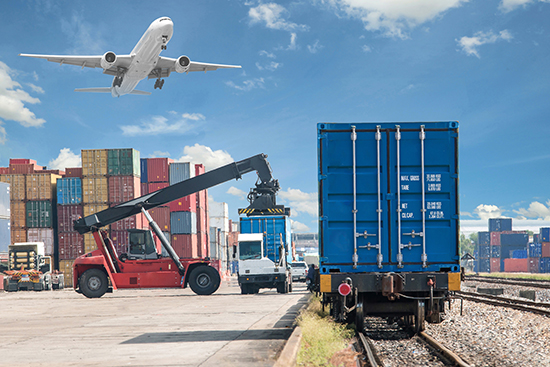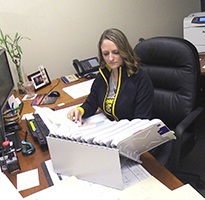An official website of the United States government
 United States Department of Labor
United States Department of Labor
| April 2016
When businesses import goods into the United States, they often contact a customs broker like Abbie Booth. Abbie works to ensure her client’s shipments meet the dozens of requirements enforced by U.S. Customs and Border Protection. “We help educate clients about regulations related to their imports,” says Abbie. “Each import is unique, and ultimately the client is the responsible party.”
Licensed customs brokers keep abreast of changing laws covering international trade. Acting as liaisons between the federal government and import/export firms, these brokers handle the logistics of moving products across borders.
Businesses hire a broker to clear their goods through customs, which includes tracking shipments, filing customs entries, and paying duties and fees. Other tasks vary, depending on the size and type of the employer. For example, Abbie oversees the daily activities of the 18-person customs brokerage firm in which she works.
Documentation. Customs brokers track the status of clients’ international shipments and prepare, submit, and store required documents. These documents include detailed invoices with merchandise information such as its country of origin and weight; special forms for goods regulated by other federal agencies, such as inspection certificates required by the U.S. Department of Agriculture for produce; and powers of attorney to act on clients’ behalf.
Customs brokers can complete and submit required forms electronically, allowing brokers to file remotely—such as from Wichita, Kansas, where Abbie works—for customs entry or exit anywhere in the United Sates. Brokers must keep a hardcopy of all documents for a specified number of days, and then store them electronically for 5 years for audit or inspection by Customs and Border Protection officials.
Payments. Imported and exported goods are assessed for federal taxes and fees or duties according to an international tariff coding system. Customs brokers review their clients’ merchandise classification and determine whether the shipment qualifies for special or reduced tariffs, such as those to or from Canada and Mexico under the North American Free Trade Agreement.
Customs brokers make their clients’ duty payments, which are required within 10 days of merchandise release, in one of two ways. One way is by paying the government on behalf of the client and then billing the client for reimbursement. The other is by authorizing payments directly to the government from the client’s automated account. They also bill clients a brokerage fee that is based either on fixed rates for services or on the value of the shipment.
Other tasks. Other customs broker responsibilities are directly related to import or export shipments. For example, brokers monitor shipments as they move through customs to ensure compliance at every stage. They also may coordinate transportation for goods at either end of the delivery process.
Some customs brokers, including Abbie, focus on overseeing office procedures and directing staff. “All the accounts of the office and the staff working on them have to be managed by a licensed customs broker,” she says. “I supervise the paperwork and the people.” She also may lead, or assign staff to present, seminars on customs- or trade-related topics for clients.
Although there are no specific educational requirements for becoming a customs broker, some skills and knowledge may be helpful. And customs brokers must be licensed, which requires passing an examination and a background investigation.
Skills. Critical thinking and problem-solving are among the skills customs brokers need so that they can understand, and help clients comply with, import/export laws. They also must be able to communicate well to interact with customs officials, explain services and procedures to clients, and write reports. And clerical skills, such as word processing and file management, are recommended.

Customs brokers must pay attention to detail, too. For example, misclassifying goods could result in the client paying too much tax, for which the broker would then need to apply for repayment, and overdue filings or payments may lead to penalties and late fees.
Adaptability is also important because of frequent changes in import/export laws and customs procedures. “There’s always something new,” Abbie says. “You have to be flexible and always be willing to learn.”
Knowledge. Some knowledge of how goods move by air, rail, sea, and road is useful. Customs brokers also must learn how to decipher government regulations. And Abbie says that, if she had known in college what her career would be, she’d have studied international business to prepare for the finance, economics, and other aspects of global trade that her job entails.
Licensing. Eligibility for taking the customs broker license exam includes U.S. citizenship, being at least 21 years old, and paying a fee. You also cannot be a current federal employee. The exam is administered twice a year by Customs and Border Protection, an agency of the U.S. Department of Homeland Security.
You may retake the exam until you pass it. With a passing score, you may apply for a broker license. The application includes more fees and a background check. The entire process, from test-taking through final approval, usually takes many months. For example, Abbie passed the exam in October 2008 and got her license in December 2009.
The U.S. Bureau of Labor Statistics (BLS) does not collect data specifically on customs brokers. Instead, BLS counts these workers among business operations specialists, all other. According to Customs and Border Protection, however, there are currently about 13,000 active, licensed customs brokers in the United States.
Customs brokers usually work in an office but may travel, either locally or internationally, depending on their employer. In fact, says Abbie, the travel perk is one of the draws of the job for some people. Whether working in the office or traveling, the job is always fast-paced and hectic. “Things change every day,” Abbie says. “You either love it or you hate it.”
Because business occurs in different time zones at all hours of the day, a customs broker’s workload is fairly constant. Abbie or another staff member is always on call outside normal work hours, including weekends and holidays. “It’s a 24/7 business,” says Abbie. “You really don’t get a break.”
Still, Abbie enjoys the work because of the service that customs brokers provide. “I like helping to educate a small or medium-sized company, to walk them through compliance,” she says, “or helping a small company that’s just gotten a patent to import what they need to get the business going. It’s rewarding to feel like I’m part of something important.”
Kathleen Green, "Customs broker," Career Outlook, U.S. Bureau of Labor Statistics, April 2016.

Abbie Booth checks resources to ensure that imports comply with the law.